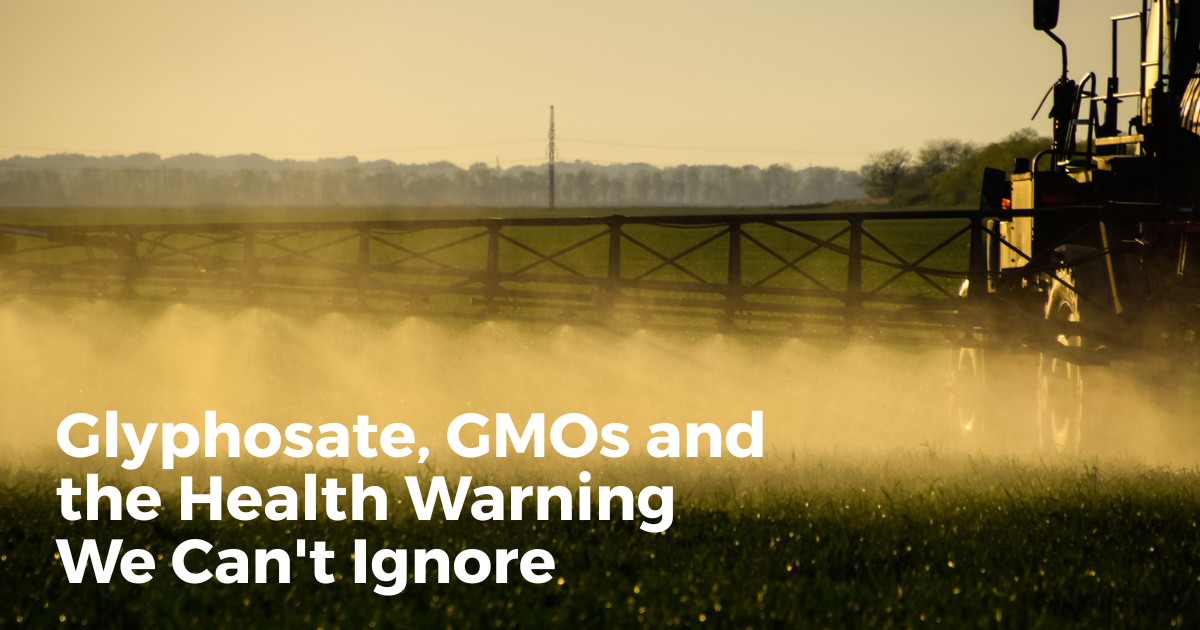Glyphosate, GMOs and the Health Warning We Can't Ignore
A new study on glyphosate confirms what many scientists and campaigners have long feared: that genetically modified organisms (GMOs) and glyphosate form a dangerous partnership, one that is driving a public health crisis globally.
New research published in June 2025 (Panzacchi et al.) presents conclusive evidence of a strong causal link between glyphosate exposure and cancer. This groundbreaking paper, co-authored by leading environmental health experts, states that the “safe” level set by the European Food Safety Authority (EFSA) is in fact not safe at all. The study provides strong evidence that glyphosate and glyphosate‑based herbicides can cause cancer in laboratory animals even at doses currently considered safe under EU (and NZ) regulatory standards.
The study reinforces earlier independent findings by French scientist Professor Gilles-Eric Séralini, whose long-term animal trial showed that rats fed GM maize and/or Roundup at levels comparable to everyday human exposure developed significant health issues, including liver and kidney damage, hormone disruption, and large, fast-growing tumours. Female rats developed mammary tumours and reproductive abnormalities, while males developed tumours up to 600 days earlier than the control group. Although initially controversial, Séralini’s study has since been republished and supported by other research, including the new Panzacchi study.
Despite this growing body of scientific evidence, New Zealand is advancing legislation that could increase glyphosate exposure across the entire food system. Two major policy changes are underway: the Gene Technology Bill, now approaching its second reading in Parliament, would allow the release of gene-edited organisms, including herbicide-tolerant crops, into the environment. At the same time, Food Safety New Zealand is proposing to raise maximum residue limits (MRLs) for glyphosate on staple foods like oats, wheat, and dried peas by as much as 100-fold.
Together, these proposals mark a significant regulatory shift, paving the way for greater use of glyphosate-tolerant GMO crops and higher chemical residues in our food, despite mounting scientific evidence linking glyphosate to serious health risks.
You can’t talk about glyphosate without talking about GMOs. As Dr André Leu of Regeneration International points out, the relationship between the two is no accident. Most genetically modified crops are engineered to tolerate glyphosate, allowing them to survive repeated spraying while weeds are killed off. The result? A massive increase in glyphosate use globally, and with it, widespread contamination of food, feed, soil, and water.
According to Dr Leu, this glyphosate-GMO system is wreaking havoc on both human and environmental health. Glyphosate has been linked not only to cancer but also to endocrine disruption, gut microbiome imbalance, and potential neurodevelopmental harm. Meanwhile, herbicide-resistant “superweeds” are on the rise, pushing farmers to use even more chemicals in a system that’s clearly failing.
Against this backdrop, the government’s push to increase maximum residue levels (MRLs) for glyphosate, while simultaneously deregulating gene technology, sends a chilling signal— corporate interests are being prioritised over the health of our food system, our land, and our people.
Aotearoa New Zealand needs to make a choice. We can continue to uphold our GE-free status and invest in organic, regenerative farming systems that protect health and the environment, whilst boosting trade opportunities. Or we can follow the failing industrial model of the United States, where glyphosate has been detected in children’s cereals, breast milk, and umbilical cord blood.
As new science makes the risks undeniable, the solution is just as clear: stop the Gene Tech Bill, reject the proposal to raise glyphosate MRLs, and support farming systems that heal rather than harm.
Sources: / Further Reading:
Panzacchi, S. et al. (2025). Is glyphosate safe at current levels of exposure? A comprehensive review of carcinogenicity studies. Environmental Health. https://ehjournal.biomedcentral.com/articles/10.1186/s12940-025-01187-2
PAN Europe. (2025, June). New scientific publication confirms glyphosate causes cancer — EU “safe” levels not safe. https://www.pan-europe.info/press-releases/2025/06/new-scientific-publication-confirms-glyphosate-causes-cancer-eu-%E2%80%9Csafe%E2%80%9D
Regeneration International. (2025, July 16). Glyphosate and GMOs Are Damaging Our Health. It’s Time to Ban Them. https://regenerationinternational.org/2025/07/16/glyphosate-and-gmos-are-damaging-our-health-its-time-to-ban-them
Séralini, G.-E. et al. (2014). Republished study: long-term toxicity of a Roundup herbicide and a Roundup-tolerant genetically modified maize. Environmental Sciences Europe. https://enveurope.springeropen.com/articles/10.1186/s12302-014-0014-5

